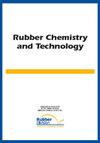MECHANICAL PROPERTIES OF NATURAL RUBBER AND STYRENE–BUTADIENE RUBBER NANOCOMPOSITES WITH NANOFILLERS HAVING DIFFERENT DIMENSIONS AND SHAPES AT LOW FILLER LOADING
IF 1.5
4区 工程技术
Q4 POLYMER SCIENCE
引用次数: 0
Abstract
Reinforcement of rubber by nanofillers has been a topic of great interest in recent years. This work compares the reinforcing efficiency of nanofillers with different topologies such as spherical (carbon black and silica), fibrous (silicon carbide nanofibers and carbon nanotubes), and sheetlike (nanoclays, expanded graphite, and graphene) in two different diene rubbers (natural rubber [NR] and styrene–butadiene rubber [SBR]) at low loadings. Tensile strength improved by 88% in the case of NR and 57% in the case of SBR by the addition of just 3 phr of graphene nanoplatelets with high aspect ratio and surface area. An increase in the Mooney–Rivlin constant (C1) with filler loading variation was also observed for these filler systems in NR and SBR. The analysis of the composites using a tube model showed that the confinement of rubber chains due to the presence of fillers with a high aspect ratio gave rise to a lower tube diameter. The addition of nanofillers resulted in higher hysteresis losses, confirming their ability for higher energy dissipation. A higher Payne effect was observed in the composites due to the formation of a percolating filler network, which was accompanied by a weak strain overshoot in the loss modulus. Dynamical mechanical analysis of the composites showed a significant increase in the storage modulus of the composites at both low and room temperatures. The reduction observed in the tan δ was correlated with the crosslink density of the composites.不同尺寸和形状纳米填料的天然橡胶和丁苯橡胶纳米复合材料在低填充量下的力学性能
近年来,纳米填料对橡胶的增强一直是一个备受关注的话题。这项工作比较了不同拓扑结构的纳米填料,如球形(炭黑和二氧化硅)、纤维状(碳化硅纳米纤维和碳纳米管)和片状(纳米粘土、膨胀石墨和石墨烯)在两种不同二烯橡胶(天然橡胶[NR]和苯乙烯-丁二烯橡胶[SBR])中在低负载下的增强效率。通过仅添加3phr具有高纵横比和表面积的石墨烯纳米片,在NR的情况下拉伸强度提高了88%,在SBR的情况下提高了57%。在NR和SBR中,还观察到这些填料系统的穆尼-里夫林常数(C1)随着填料负载的变化而增加。使用管模型对复合材料进行的分析表明,由于存在高纵横比的填料,橡胶链受到限制,导致管直径较低。纳米填料的加入导致了更高的磁滞损耗,证实了它们具有更高的能量耗散能力。由于渗透填料网络的形成,在复合材料中观察到更高的佩恩效应,这伴随着损耗模量的弱应变超调。复合材料的动态力学分析表明,在低温和室温下,复合材料的储能模量都显著提高。观察到的tanδ的减少与复合材料的交联密度有关。
本文章由计算机程序翻译,如有差异,请以英文原文为准。
求助全文
约1分钟内获得全文
求助全文
来源期刊

Rubber Chemistry and Technology
工程技术-高分子科学
CiteScore
3.50
自引率
20.00%
发文量
21
审稿时长
3.6 months
期刊介绍:
The scope of RC&T covers:
-Chemistry and Properties-
Mechanics-
Materials Science-
Nanocomposites-
Biotechnology-
Rubber Recycling-
Green Technology-
Characterization and Simulation.
Published continuously since 1928, the journal provides the deepest archive of published research in the field. Rubber Chemistry & Technology is read by scientists and engineers in academia, industry and government.
 求助内容:
求助内容: 应助结果提醒方式:
应助结果提醒方式:


